- Home
- Sarah Zettel
Palace of Spies Page 5
Palace of Spies Read online
Page 5
I staggered. My balance was gone. He could not have spoken so. Not even he. No. I had misheard somehow.
But my uncle raised his slitted eyes, and I felt his gaze like a sword’s point on my skin. “A whore,” he repeated, as if he enjoyed the feel of the word against his clenched teeth. “Your mother dealt in men and illicit liaisons and died of it.”
It was impossible. There was no circumstance under which this could be the truth. Except . . . there was Mr. Tinderflint’s card in my sleeve. He’d spoken of knowing my mother, this strange, older, obviously well-off man. He said he’d known her well, but not where he knew her from or how they’d met. There was a roaring in my ears, and suddenly I wanted nothing so much as to creep away and hide.
Uncle Pierpont stalked around the corner of his desk until his skinny shadow slanted over me. His breath was oddly cold and smelled of onions and tobacco.
“If it had been up to me, you would have starved in a ditch,” he said. “But your aunt, my wife, talked so much of appearances and Christian charity that I agreed to take you in. I’ve fed and clothed and sheltered you for eight years. I’ve kept my silence to spare my family’s name, but I am done with it. You will take this marriage offer, or you may leave my house this instant and go to the devil, just as your mother did.”
I closed my eyes and swallowed; swallowed tears, swallowed denial, swallowed the boundless anger raging through me. I had to be strong. I had to remember what was happening right this moment and what had happened the night before.
“No,” I croaked.
“Speak up, miss. I did not hear you.”
“I said no, sir.” I lifted my chin and drew myself up to my full height. “Mr. Sandford is angry because I fought when he attacked me. Ask how that happened. I will tell you the whole of it. I will not be made into a liar by someone who would permanently shame me, and I most certainly will not marry him.”
I’d done it. I’d spoken plainly and with dignity. My uncle, for all his faults, was a clear-eyed man. He would see by my attitude and bearing I told the truth. Then he would realize Sebastian had deliberately set out to defame me. He would not allow a man who so insulted the honor of a blood relation into his family, whatever he might believe about her—my—mother.
There may be a time when I am more profoundly mistaken, but it has not come yet. My uncle crossed the room in two strides. He grabbed my arm and, ignoring my cries, propelled me out the door and down the hall.
“Husband . . .” My aunt came running down the stairs. My uncle did not even break stride. He dragged me past the staircase, past the maid and the footman, who stared in equal confusion as I stumbled and squirmed in my uncle’s grip. Olivia stood in the doorway to the breakfast room, open-mouthed. Even the dogs peeking around her skirts were stunned to silence. I was dragged past them as well. And finally, most terribly, past Sebastian Sandford, who stood smiling on the threshold of the blue parlor.
With an oath, my uncle opened the door to the street. He shoved me through. I staggered down three steps before I was able to catch the railing.
The door slammed shut.
“No!” I ran back up the steps, just in time to hear the clatter of locks being closed.
“Uncle! Olivia!” I banged on the door. I rattled the handle, but it was no use. My uncle had kept his word. I was out on the street, with nothing save the clothes on my back.
I had time to gasp only once or twice before the bow window on the second story banged open.
“Peggy!” Olivia leaned her head out, and I hastily backed down the stairs so I could see her better. “Has Father gone mad? Don’t worry—”
She got no further. My uncle was beside her. He pulled his daughter inside the house as ruthlessly as he had pushed me out. With a look of contempt, he shut the casement. I watched, my heart in my mouth, as Olivia waved her hands and pointed her fingers at her father, clearly arguing forcibly. Her father didn’t move until he recalled that I could see them. Then he reached up to twitch the drapes shut.
I heard the locks turning again. My heart in my mouth, I rushed to the top of the steps. Of course I needn’t have feared. Of course Olivia had persuaded her father.
Of course it was Sebastian, whistling, as if pleased with the outcome of his errand. Our eyes met. He bowed, still whistling, and walked on past me. The door slammed shut before I could so much as move.
I stayed on the stoop for a long time after this, twisting my fingers and trying to keep up hope that Olivia or my aunt would be coming soon to let me back in. The circumstance was so strange, I could not imagine what else might happen. But the time stretched out, and the square began to fill with carts and wheelbarrows and criers and people of all sorts. Not a few of them turned a questioning glance toward the girl standing on the steps before this fine, red brick house. I tried to straighten my cap and smooth my skirts. I tried to look as if nothing was wrong, but it was no good. I was loitering outside, alone, in a plain dress and cap not meant for anyplace but the house. I had no proper business doing such a thing, and even the scissor grinder pushing his barrow could see as much.
It began to dawn on me that the door might not open again. I descended the stairs as slowly as I could manage, just in case I was being too hasty. Perhaps, I thought, if I walked out a ways, I could go to the common green as Olivia and I did so often on fine mornings. It would give the house time to settle. Olivia could find me there and let me know I was allowed back in.
It is strange that when your mind seems completely empty, it simultaneously becomes difficult for any new thought to penetrate. Like the fact that someone was trying to catch my attention.
“Psst! Psst! Oh, for Heaven’s sake, miss. Psst!”
“Templeton?” I hurried up to the area railing, where the stairs descended to the kitchen entrance. Olivia’s maid stood on tiptoe on the other side, trying to watch me while at the same time looking back over her shoulder toward the kitchen door.
“At last! Here. From the young mistress.” She thrust what she carried through the bars and into my hands. There was a leather bag that clinked, indicating coins inside.
“Quick now, miss,” Templeton was saying. “You must go away from here before the master sees. Miss Olivia says—”
“Too late, I’m afraid, Templeton,” said a gruff voice behind her.
Bromley, my uncle’s butler, stepped out of the kitchen. Bromley was a tall, bald man with a sagging face and protruding belly who wore his livery with all the pride of a soldier in his red coat.
“The master has seen,” Bromley informed us both sternly. “His orders are that whatever the young mistress sent out is to be retrieved. He further instructs me to say, Miss Fitzroy, that if you don’t clear off immediately, I’m to throw you into the gutter.”
“You can’t do it, Mr. Bromley,” said Templeton. I’d never noticed before that Templeton was older than I was, by a good ten years or so. She was grown woman, for all she was small and round-faced. I’d never given her any thought at all, and here she was taking my part in this disaster. “She’ll have nowt!”
“You mind your tongue and be thankful there’s no talk of turning you out.” Bromley thrust his broad hand through the railing bars, like a prisoner reaching out of a cell. Or a warden reaching in. “If you please, miss. Templeton’s already jeopardized her place. I’ll not do the same.”
I looked at stout, trusty Templeton and thought about how quickly she could be standing out here on the cobbles beside me.
“Thank you for your pains, Templeton.” I handed Olivia’s little purse to Bromley. The butler tucked it into his coat pocket, his stony expression softening just a bit.
“You best think on what you’ve done and repent, Miss Fitzroy. Let the master see you’re truly sorry and that you’ll be obedient. He might still be ready to settle the matter.”
Bromley was right, of course. I must repent. As soon as I did, I’d be allowed to walk back into Uncle Pierpont’s house. There, I’d be most generously permitted to marry
where I was told and say nothing about anything for the rest of my days.
“Please give my thanks to Miss Olivia, Templeton,” I told her slowly. “For all she has done.”
I turned my back on the servants, the area railing, the house, and all it held, and walked away.
CHAPTER SEVEN
IN WHICH CERTAIN TRUTHS OF A SHOCKING NATURE ARE REVEALED.
It took a long time to find a sedan chair willing to carry me to the address on Mr. Tinderflint’s card. I had no money and could offer only a feeble promise that they would be paid upon my safely reaching my destination. Evidently the chair men who plied London’s busy streets had heard such promises before. I had to place my Belgian lace handkerchief and no fewer than six silver hairpins in pawn with the lead man before I was allowed to take my seat and be bumped and jostled through crowds and over cobbles in the direction, I assumed, of Mr. Tinderflint’s house.
This was not where I wanted to go. Very far from it. My circle of acquaintances in town was small, and among them only the tiniest number might be ready, much less able, to take me in as I stood. But Kitty Shaw was in the country helping her sister with her lying-in. Honoria Dumont was sick with measles, and Liza Frank was accompanying her bilious aunt to Bath to take the waters. That left the address on the card and Mr. Tinderflint’s vague and worrying declaration of an acquaintance with my mother.
My uncle’s accusations would not leave me. All during that terrible, jolting ride through crowded streets filled with the stink and riot of London, not to mention the ankle-deep spring mud, I sat in dread of where I might be going, and what I might find when I got there.
As it transpired, what I found was an entirely respectable square of new terraced houses, part of the endless building and bettering happening at the western edge of restlessly expanding London Town. I also found rain and plenty of it. This turned the unfinished square to a mire and drew from my chair men some truly novel imprecations. Several of these were directed at me when I asked the lead man to knock at the door of the house and ascertain if Mr. Tinderflint was at home. I had no idea what I’d do if he wasn’t, but I’d had enough of huddling on doorsteps for one day.
I craned my neck out the window and saw that the door was answered by a man in a black coat, who stared at the chair man, blank-faced. The chair man gestured and jerked his thumb at me with increasing energy. My heart shriveled. It had been some deception. I’d been given a false address for some reason. Or the chair man had brought me to the wrong house, or—
But Mr. Tinderflint’s head poked around the black-clad man’s shoulder and ducked back just as quickly. A moment later, my man squelched his way back to the chair, which was slowly settling up to its rails in the mud.
“She’s to be delivered round back,” he growled. “An’ he better be payin’ for it.” The accompanying threat he uttered was physically impossible and unfit for publication.
The back garden was a square of sparse, limp grass with a threadbare lime tree doing its best to keep up appearances. The chair man wouldn’t hear of my getting out into the rain, at least not until Mr. Tinderflint had laid several coins into his hand. Then he all but tipped me from the chair before he and his companion squelched away.
“Come in, my dear, come in, come in.” Mr. Tinderflint bowed several times as I ducked into the doorway. “Just this way. Quickly now.”
He repeated this admonition several times while ushering me through the surprisingly deserted kitchen, along a dim corridor, and into a sparsely furnished parlor. There was a fire in the shining grate, and the few furnishings were as new as the house. So were the thick green curtains, which Mr. Tinderflint immediately drew shut, plunging the chamber into a gloom my imagination at once labeled “forbidding.” The young housemaid who sat in the chimney corner, quietly busy with some piece of mending, was some comfort, but not much.
“Do sit, please, Miss Fitzroy. I’m so delighted you’ve come.” Mr. Tinderflint stooped to light a fresh candle from the fireplace. “Yes, yes. Delighted.”
Between the candle and the fire, I finally was able to get a good look at Mr. Tinderflint. My impression from the previous night that he was simply stout and overdressed was proving somewhat mistaken. It is not often in life that one encounters an entirely spherical individual, but Mr. Tinderflint was apparently striving to achieve that perfection of form. This was greatly assisted by the fact that he was so short. His face was as round as his figure and covered with a solid layer of paint and powder. The equally well-powdered curls of a full-bottomed wig cascaded across his shoulders. His coat, waistcoat, and shirt were obscured by masses of braid, lace, buttons, and ribbons of all colors. Black velvet breeches and white silk stockings gleamed above high-heeled, gilt-buckled shoes. That such a very round man could balance so lightly on such stilts was impressive.
I did sit as I was bidden, taking care to rearrange my skirts so I had a moment to think. As I’d traveled here, my mind had been occupied by what I might do if I was turned away from the door or if I found myself facing some sort of ill-favored house. Now that I was in an entirely unremarkable parlor, I was at a loss to know how to speak with this man.
“You said, last night,” I began. “You said . . . you . . . knew my mother?”
“I had the honor, yes,” said Mr. Tinderflint. “You see, Miss Fitzroy, your mother, Margaret Fitzroy, nee Margaret Hollingswood, was a correspondent of mine. During some of the uncertainty and, dare I say it, the unpleasantness that preceded the ascension of our current sovereign, King George, she kept me informed of those events in which we both took an interest and that might be of use to certain others of our, my, acquaintance.”
It took me a long moment to untangle this statement, and when I did, what I saw caused my breath to come up short.
“You’re talking about the succession,” I said slowly. “About the rebellion in ’08.” In that year, the Jacobite rebels had declared that James Stuart was supposed to get the throne, instead of King George. Said and were still saying. In fact, in Scotland they had spent much of the previous winter up in arms over the dispute until the troops marshaled by our new king had put them down.
Understanding fell into place. Understanding pulled me up straight and brought out my next words in a most unbecoming shout.
“You—you’re saying my mother was a spy!”
CHAPTER EIGHT
IN WHICH OUR HEROINE FINDS HERSELF FACED WITH A MOST FATEFUL DECISION.
“Shhh! My dear, a bit lower, if you please,” cautioned Mr. Tinderflint, even though the maid in her corner had not so much as glanced at us. “I would not call her a spy, no, no, no.”
“Then what would you call her?” Considering that I’d been dreading he would tell me he’d been what is politely known as my mother’s protector, I should have been relieved to hear she’d merely engaged in political intrigue. That, however, was not my first reaction.
“A woman of letters with whom I corresponded,” he replied. “A woman of unimpeachable character, strong loyalties, and great learning, with whom one could share an exchange of views.”
“And news?”
“Just so.” Mr. Tinderflint got to his feet. “I understand that you have questions, many questions, but there is someone I must fetch before we go further. It would be best if you thought of him as my partner. Yes. Yes. Now, rest yourself and . . . when my partner arrives, my dear, it is not at all necessary to mention your mother.” Mr. Tinderflint attempted to wink at me, but all he managed was a nervous twitch of one eye before he bustled out, leaving me alone with the maid.
I sat still, clutching my hands together and trying to make some sense of what I had just been told.
History taught us that in the life of Great Britain, there had been many points when the succession to the throne was in dispute. Compared to the Wars of the Roses or the great Civil War, the transition from Queen Anne of the House of Stuart to King George of the House of Hanover was scarcely worth mentioning. Nor was it surprising that there should ha
ve been some dispute. After all, King James II had had a legitimate son. Admittedly, James II had been dethroned years ago by the nobles of Britain, with the help of his daughters, Mary and Anne. But he had been king, and he had had a son, and that son, James Edward Stuart, was alive. When Queen Anne died without a living child to her name, it might have been readily assumed that James Stuart would be recalled to ascend the throne as James III.
Yet there remained the tiny matter of religion. Officially, England is a Protestant nation. Queen Anne was a Protestant queen. James Stuart remained stubbornly Roman Catholic. So, the queen and lords were forced by various carefully written laws to find some Protestant relative to take the throne. The nearest such person was George Louis of Hanover, now King George of Great Britain.
That was meant to be the last word upon the subject. But James Stuart, now called the Pretender, was not prepared to let the matter rest. He’d tried to forcibly change the succession decision in ’08 and again just last winter. Naturally, where there is rebellion, there are spies. And a spy, one supposed, should be such a person as could pass easily in a variety of company without being suspected. A pleasant, witty lady of good birth, for instance.
Could it possibly be true that the mother who had sung me to sleep and taught me my letters and taken me on walks was a spy? It would explain what my uncle saw that caused him to say my mother was “going about with men.” She was gathering information. It was exciting. It was dramatic. It was also ridiculous beyond imagining, because it meant that the beribboned, fluttery figure who had just left the room was himself a spy, possibly even a spy master.
What would such a man want with me?
I looked to the maid, still busy at her mending.
“Have you worked here long?” I asked. She did not even raise her head. I repeated my question. This time she did glance up. She also smiled and shrugged and returned to her needle and thread.

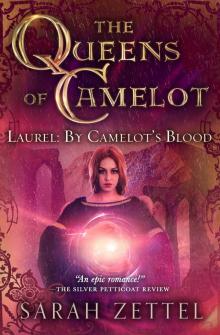 Laurel
Laurel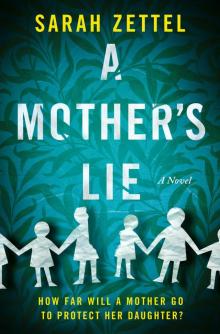 A Mother's Lie
A Mother's Lie Playing God
Playing God Dust girl
Dust girl Sword of the Deceiver
Sword of the Deceiver Let Them Eat Stake: A Vampire Chef Novel
Let Them Eat Stake: A Vampire Chef Novel Dust Girl: The American Fairy Trilogy Book 1
Dust Girl: The American Fairy Trilogy Book 1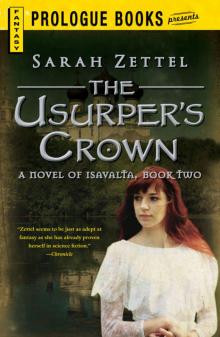 The Usurper's Crown
The Usurper's Crown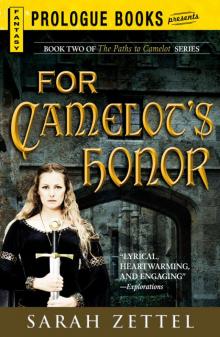 For Camelot's Honor
For Camelot's Honor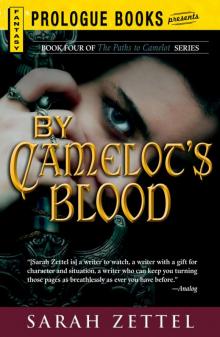 Camelot's Blood
Camelot's Blood Kingdom of Cages
Kingdom of Cages Fool's War
Fool's War Golden Girl
Golden Girl A Sorcerer’s Treason
A Sorcerer’s Treason The Firebird's Vengeance
The Firebird's Vengeance A Taste of the Nightlife
A Taste of the Nightlife Assassin's Masque (Palace of Spies Book 3)
Assassin's Masque (Palace of Spies Book 3) Reclamation
Reclamation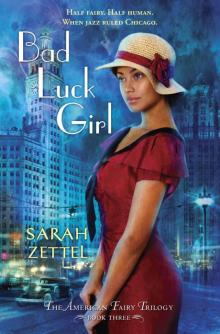 Bad Luck Girl
Bad Luck Girl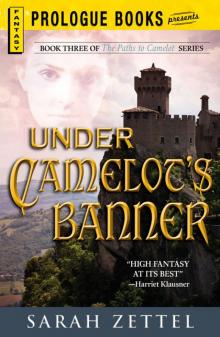 Under Camelot's Banner
Under Camelot's Banner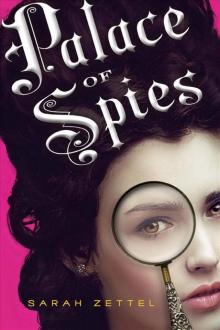 Palace of Spies
Palace of Spies Dangerous Deceptions
Dangerous Deceptions Quiet Invasion
Quiet Invasion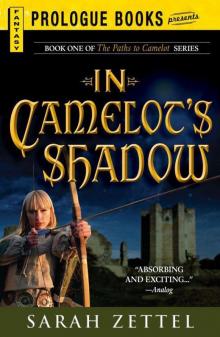 In Camelot’s Shadow: Book One of The Paths to Camelot Series (Prologue Fantasy)
In Camelot’s Shadow: Book One of The Paths to Camelot Series (Prologue Fantasy)